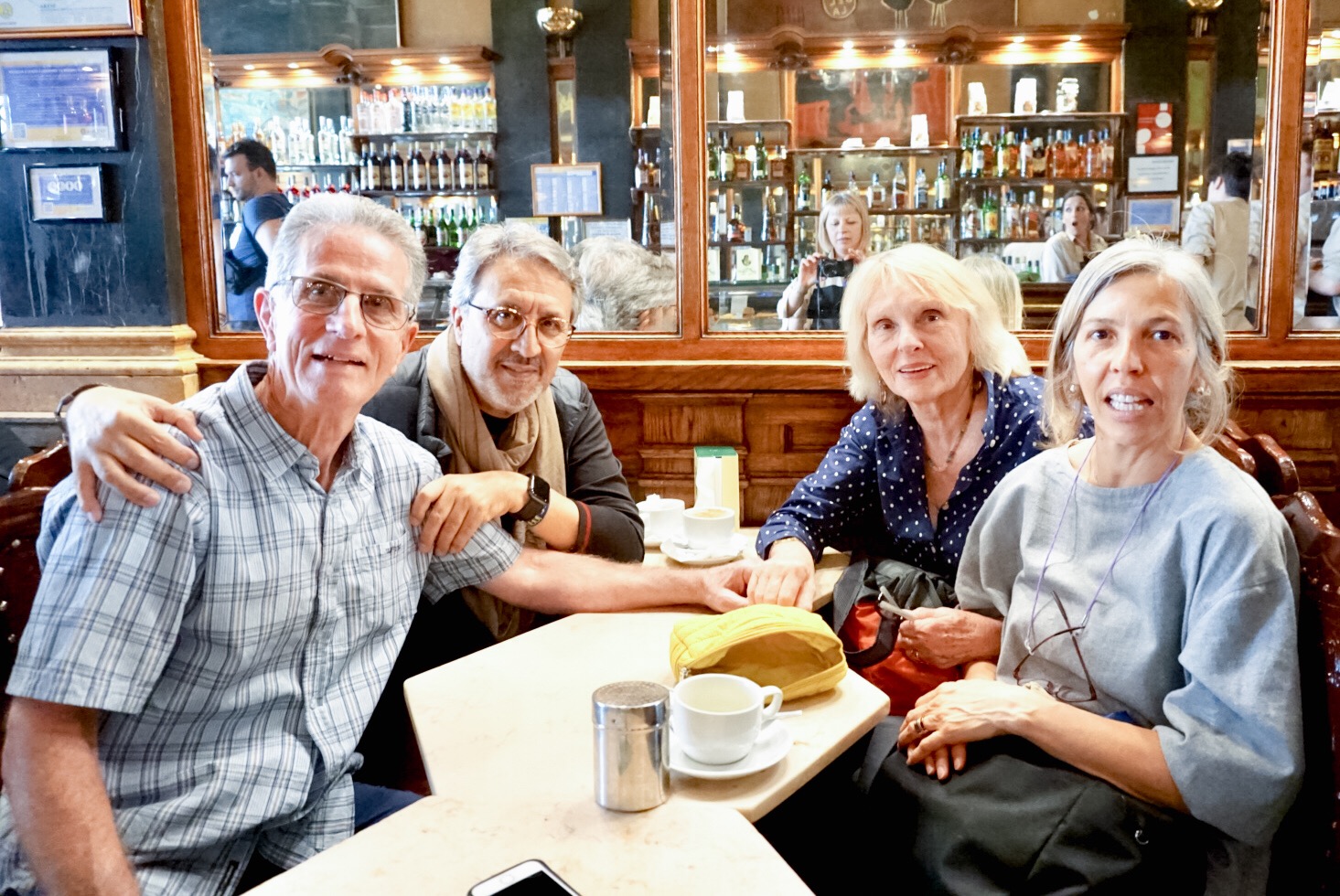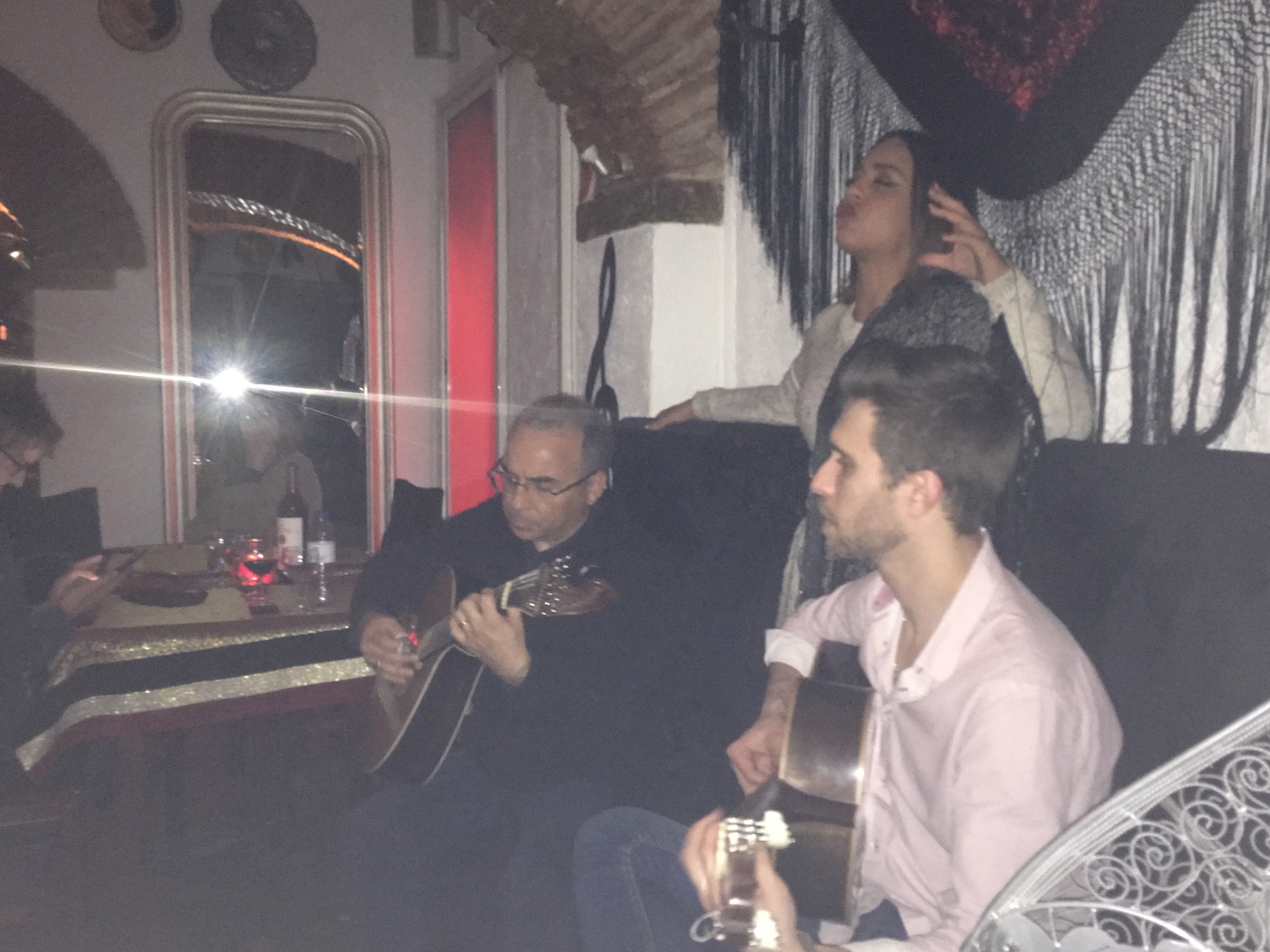I waited at a distance to capture the greetings between Corrie and our Portuguese friends, outside the Brasileira (a dark and mysterious coffee shop, once the meeting place of poets and writers destined to change the world) not far from the world’s oldest bookshop. I waited in the shadow of Pessoa’s statue with my Itchy camera. There’s nothing for me like the capturing of that first emotional look and hug of old friends whom you have not seen for some time. There was a mixture of sadness of it being so long but happiness that it was now reality.
We sat for coffee and reminisced for some time in this cafe that seemed to know what we were doing, reflecting our intimacy, and respecting our connection, as we talked of our short time together walking our first camino. They had come laden with gifts – she, with exquisite Portuguese delicacies, he, with the compulsory camino passports that we need in order to verify our ‘pilgrim status’, allowing us certain privileges in accomodation costs etc.
Old Lisboa is in a valley – partly a reclaimed river, rebuilt in the 18th century following a huge devastating earthquake that destroyed nearly all the ancient buildings and devoured a quarter of the population. From the valley this beautiful city climbs steeply on either side, offering differing aspects as you look back over its peaceful aura. Our friends guided us down the cream marbled footpaths (whose intricate designs of black marble were embraced by the blue tiled walls of Portuguese style buildings), enlightening us on all things Lisboan.
We crossed the city with its eclectic mix of popular buskers at strategic points of this beautifully tiled traffic free mall and up the other side well into the original Fado territory of Lisboa. We looked over the city now from the much older side of Lisboa, beneath its imposing castle, mostly untouched by that life changing earthquake. Its Roman history lies partially uncovered there in the form of a theatre where patrons sit in that original horseshoe style, with seats looking out to sea.
Down the other side of this castle and cathedral hill, our friends took us through the quieter Jewish part with their ‘close together flats’ straddling narrow lanes built closely to keep cool this hot part of the city owing to its thermal springs. Once again there is Fado, that helps to define the citizens of one of the world’s smallest cities. But how do we define Fado and that feeling that is closely associated with this melancholic sound?
In the evening in the many restaurants you can hear the melancholic sounds of Fado. A Lisboan with a guitar and others sing these sad songs that speak of the lives, struggles and passions born on the local waterfronts. The deep feelings expressed in Fado come from the word ‘saudade’, a word very hard to define. Some say it is a profound longing for someone or something you love. For others it is about the sad memories of good times past. It has been said that there is no need to cry because it’s over, instead to smile because it happened.
Our friends smile a lot, but embrace sadness as well. As we said goodbye, their strong hugs had a sense of both these feelings, which they say is vital for true happiness. I felt this strongly in their profound embraces and began to understand the meaning of what the Portuguese say when leaving their friends – “Vou ter saudades tuas” (I’ll miss you). It is this and much more, expressing the void that will exist on the person’s departure. We will miss them. It is our feeling, of saudade.



A lovely encounter for the start of your walk. Best of luck Will and Corrie for this new adventure.
Thanks Sue
PS love the photo of the musicians and the expressive look on the face of the woman !
Just now catching up your log, dear Will. Touched by the beautiful way you describe your meeting with dear old friends, and the essence of Fado. Portugal is now even higher on my list of must-see countries as a result. Thank you!
Thinking of the two of you tonight.
Making pasta sauce with what are now, and forever more known as the ‘Boag sewer mix’ of tomatoes, I believe we pay a premium for all the different colours at Balmain woolies.😁
Can’t wait to see supporting photos of your beautiful description of Old Lisboa.
Lovely to hear from you Kyle. I was a bit lazy as Itook photos years ago of Lisboa and thought I had done that but they aren’t on this ipad, remind me when we get home. Just written my blog that describes some recent stuff ups. Ah, those beautiful tomatoes.
Talk soon
Will